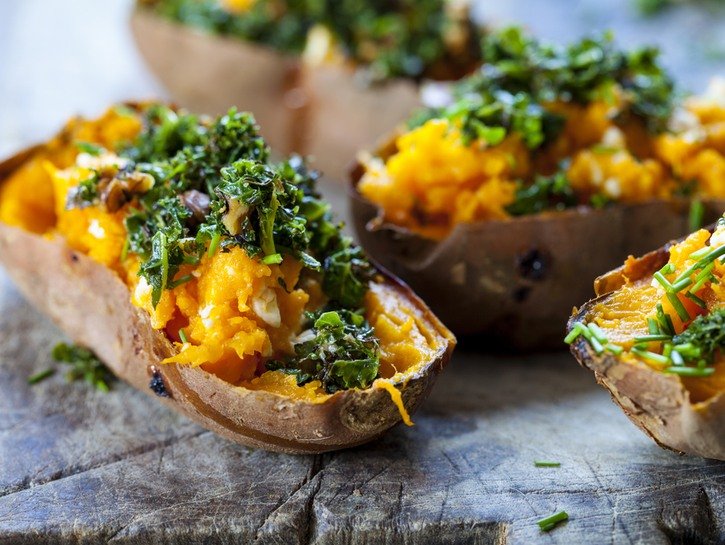Everyone’s heard of loaded potato skins, but if you’re a sweet potato lover you might be wondering – is the skin of the sweet potato just as edible? The short answer is yes. The long answer is that not only are they safe to eat, they’re low in fat and super good for you as well. In fact, sweet potatoes are one of the most nutritious vegetables out there (and interestingly, are only distantly related to potatoes). Whether you want to load them up with cheese, bacon, sour cream, walnuts, spinach, and/or guac, sweet potato skins are a versatile, fun-to-eat option with a near-endless variety of topping combinations.
Fiber
The skin of sweet potatoes is an excellent source of fiber, which carries potential health benefits such as reducing cholesterol, regulating blood sugar, and encouraging digestive efficiency and bowel regularity. Fiber-rich foods are also associated with weight loss, as high-fiber foods make you feel more satisfied for longer, meaning you feel more full after eating less.
Vitamin C and Vitamin E
A single sweet potato has nearly half the recommended daily amount of vitamin C, a water-soluble vitamin that helps heal wounds and maintain bones and teeth. Sweet potatoes also provide your daily recommended vitamin E, plus no saturated fat. Both vitamin C and vitamin E are antioxidants that boost immune systems to help protect you from a number of illnesses.

AS Food studio/Shutterstock
Beta-Carotene
Sweet potato skins are full of beta-carotene, an antioxidant that converts to vitamin A in the body. Vitamin A is great for improving eyesight and eye health, as well as strengthening the immune system. Vitamin A is known to be great for the skin, while beta-carotene fights free radicals that cause skin to age.
Potassium and Iron
Rich in potassium, sweet potatoes naturally have some of the highest concentrations of the mineral, which regulates fluid balance in the body and controls the heart’s electrical activity. Sweet potato skin is also great for iron, a mineral necessary for producing red blood cells and facilitating the transport of oxygen from the lungs throughout the body.
Manganese
Sweet potatoes are an excellent source of manganese, an essential trace mineral which helps your body maintain bone health, process cholesterol, absorb calcium, and control blood sugar.

AS Food studio/Shutterstock
Calories and Carbs
Because sweet potato skins are dehydrated, they’re bound to be a more concentrated source of calories than a baked sweet potato. A 3.5-ounce serving of dried sweet potato has 378 calories, whereas the same size baked sweet potato (including the skin) has only 90 calories. Most of the calories in dried sweet potato come from its carb content, with a 3.5-ounce serving up 87 grams of carbs.
Always Double Check For Safe Consumption
Delicious as they may be, know the signs of a sweet potato with skin that’s just not safe to eat. Sweet potatoes with visible insect damage, blackened areas, or mold should have those sections cut away and removed. Always wash your vegetables thoroughly before cooking and consuming, but for sweet potatoes especially, remember to brush and clean the dirt, soil, and/or chemical residue off the skin before carving off and cooking the skins.
